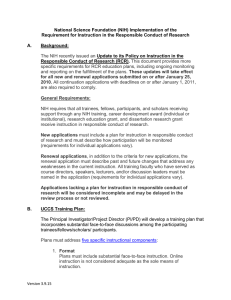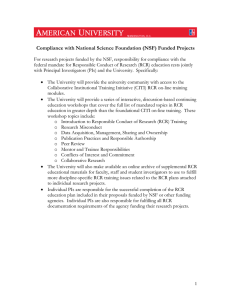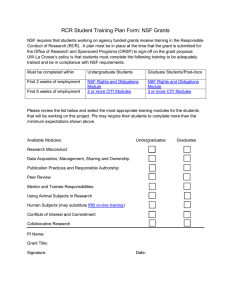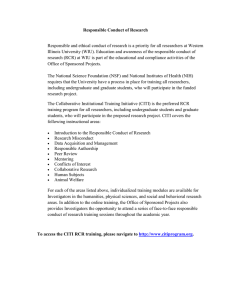Responsible Conduct of Research
advertisement
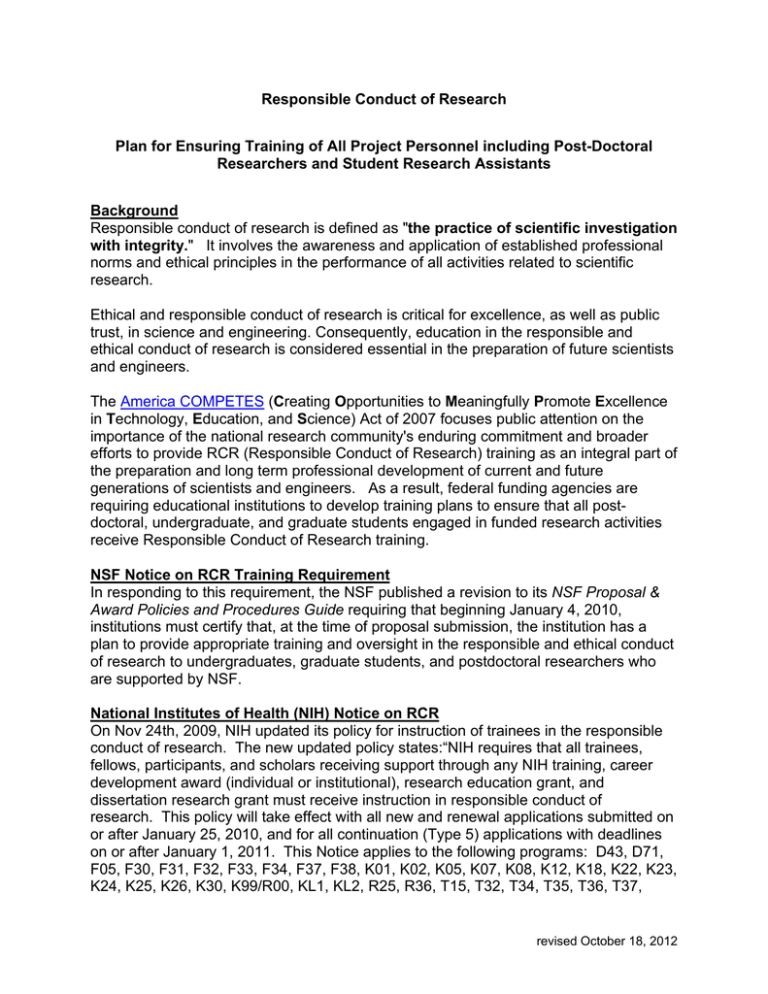
Responsible Conduct of Research Plan for Ensuring Training of All Project Personnel including Post-Doctoral Researchers and Student Research Assistants Background Responsible conduct of research is defined as "the practice of scientific investigation with integrity." It involves the awareness and application of established professional norms and ethical principles in the performance of all activities related to scientific research. Ethical and responsible conduct of research is critical for excellence, as well as public trust, in science and engineering. Consequently, education in the responsible and ethical conduct of research is considered essential in the preparation of future scientists and engineers. The America COMPETES (Creating Opportunities to Meaningfully Promote Excellence in Technology, Education, and Science) Act of 2007 focuses public attention on the importance of the national research community's enduring commitment and broader efforts to provide RCR (Responsible Conduct of Research) training as an integral part of the preparation and long term professional development of current and future generations of scientists and engineers. As a result, federal funding agencies are requiring educational institutions to develop training plans to ensure that all postdoctoral, undergraduate, and graduate students engaged in funded research activities receive Responsible Conduct of Research training. NSF Notice on RCR Training Requirement In responding to this requirement, the NSF published a revision to its NSF Proposal & Award Policies and Procedures Guide requiring that beginning January 4, 2010, institutions must certify that, at the time of proposal submission, the institution has a plan to provide appropriate training and oversight in the responsible and ethical conduct of research to undergraduates, graduate students, and postdoctoral researchers who are supported by NSF. National Institutes of Health (NIH) Notice on RCR On Nov 24th, 2009, NIH updated its policy for instruction of trainees in the responsible conduct of research. The new updated policy states:“NIH requires that all trainees, fellows, participants, and scholars receiving support through any NIH training, career development award (individual or institutional), research education grant, and dissertation research grant must receive instruction in responsible conduct of research. This policy will take effect with all new and renewal applications submitted on or after January 25, 2010, and for all continuation (Type 5) applications with deadlines on or after January 1, 2011. This Notice applies to the following programs: D43, D71, F05, F30, F31, F32, F33, F34, F37, F38, K01, K02, K05, K07, K08, K12, K18, K22, K23, K24, K25, K26, K30, K99/R00, KL1, KL2, R25, R36, T15, T32, T34, T35, T36, T37, revised October 18, 2012 T90/R90, TL1, TU2, and U2R. This policy also applies to any other NIH-funded programs supporting research training, career development, or research education that requires instruction in responsible conduct of research as stated in the relevant funding opportunity announcements.” RCR Training at California State University, Fresno (Fresno State) In an effort to ensure responsible conduct of research on the campus of Fresno State, and in order to provide valuable professional development to current and future generations of scientists and engineers, the University requires Principal Investigators, Co-Principal Investigators, key personnel, post-doc scientists and student research assistants (graduate and undergraduate) to complete Responsible Conduct of Research training prior to being hired by a federal research grant funded by NSF or NIH. Under the guidance of the Office of Research and Sponsored Programs, Fresno State will utilize an existing on-line training program created by the National Center for Professional and Research Ethics with the support of the National Science Foundation as a minimum training requirement for both NSF and NIH grants. Steps for Completing Required RCR Training 1. Go to the Ethics CORE website- http://nationalethicscenter.org. 2. To register a username click on Register at the top, right corner of the screen. 3. Complete the captcha at the bottom of the screen and click Create Account. 4. Once the account is created, you will receive a confirmation and will be asked to check your e-mail. 5. Log in to your personal email and click on the link to confirm. 6. To Confirm, log in with your username and password. 7. Once you are at your MyHub page Click on RCR Modules from CMDITR (right side of the screen) then select RCR User Account Registration from the drop down menu. 8. Select California State University, Fresno as the group you are affiliated with. Click Register. 9. Click on each individual subcategory of the Module to complete. As you finish each individual section they will be checked off with a red check mark. Once you finish the entire module you will see a yellow medallion stating the module is complete. Complete all 3 modules of training (approximately 3 hours) 10. When you have completed the RCR training (all three modules) you will see an orange banner congratulating you. 11. Upon completion, please e-mail orsp@csufresno.edu (in the subject line, please note RCR training) with your completion date. ORSP office will then retrieve your completion certificate and e-mail it to you. If you would revised October 18, 2012 like a hard copy of your certificate, please contact the ORSP office at 559278-0840. All personnel must complete the training prior to commencing any work on a federally funded NSF or NIH grant. If any personnel begin work on a grant prior to completing the training, they will be asked to cease all work immediately on the grant and complete the required training. Principal Investigators on federal grants are responsible for ensuring that students are aware of the RCR training requirements and that the training has been completed. Training certification will be good for a period of two (2) years. After two years, postdocs and students (graduates and undergraduates) must be re-certified. Additional RCR Training Additional RCR training required in certain circumstances in the areas of human subjects protections and animal care and use can be completed as needed by visiting http://phrp.nihtraining.com/users/login.php and by face-to-face meetings between the PI and post-doc/student researcher. revised October 18, 2012
